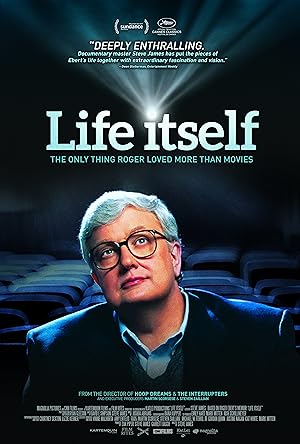
Life Itself Page #7
One time,
I went to see Roger.
He was kind of eager and
bouncing to give me something.
He gave me this letter,
actually from Laura Dern.
"Dear Roger,
I want you to know
that your generosity
and expertise
at the Sundance Tribute
meant the world to me.
I've tried to come up with
an appropriate way to thank you.
This box and its contents,
a jigsaw puzzle,
I have treasured for some time.
It was given to me
by the Strasberg family
when Lee Strasberg
passed away.
It was Marilyn Monroe's,
who collected puzzles,
and it had been given to her
by Alfred Hitchcock.
That night at Sundance
you inspired me
about film and contribution
and I wanted to pass along
film and connection in some way.
Thank you again.
Love to you and Chaz.
Laura."
And then Roger gave me this gift,
which I refused.
I said, "You cannot
give me this gift.
I cannot accept this gift."
And then he said,
"You're going to accept the gift,
because you have to one day
give this
to somebody else
who deserves it."
What's it a jigsaw puzzle of?
I've always
been terrified to make it.
I mean, this is
the jigsaw puzzle
that Alfred Hitchcock
gave Marilyn Monroe.
In the autumn of 1967,
I saw a movie named I Call First,
later to be retitled,
Who's That Knocking at My Door.
The energy of the cutting grabbed me.
It was the work
of a natural director.
I wrote a review
suggesting in 10 years
he would become
the American Fellini.
I said, "You think it's gonna take
that long?", and I was serious.
I'm just like, it's over here.
What are you talking about?
It was the first
real strong encouragement.
Yes, there are defects
in the movie.
But he saw something special
and that had to be nourished.
As you know, I carried your review
around with me
when I was in Europe in 1968.
It made me...
I kept reading. Is that really
about me? You know, wow.
So refreshing to find
a director and an actor
working right
at the top of their form.
I think Raging Bull is one of the
great American pictures of the year.
His greatest film is
an act of self-redemption.
In the period before it,
he'd become addicted to cocaine
and told me that after an overdose,
he was pronounced dead
in an emergency room
and resuscitated.
During the '80s was extremely...
I was gone, basically.
Broke, and I'd gone through
some bad, bad periods.
My third marriage had broken up,
and I was basically alone.
The only thing that saved me
or made me want to...
continue just like living,
in a way, was my agent called
and said, "You know, there's
this festival up in Toronto."
I said, "Yeah."
"Roger Ebert, Gene Siskel,
they wanna give you this tribute."
I was kind of scared.
Could I walk down
this theater aisle
and go up on a stage,
knowing who I am?
But I knew
that they believed in me,
and I have that in my house now,
in a special place
where only I can see it,
that I pass by every maybe,
five to six minutes, I see it.
But that night changed it.
And I started
my life again, you know.
It was...
I didn't feel inhibited with Roger.
He was that close.
Roger has, unlike just about
any of the rest of us,
arrived at this point
where he is
kind of the peer of the people,
of some of the people
that he writes about.
It's very complicated,
I think, when you have
personal relationships and
friendships with these people,
because it cannot
but cloud your judgment.
I am infinitely corruptible.
I do not want to get to know
these people as people.
I want to think of them
as fictional characters.
I mean,
my obligation is to write
what I think about a movie,
and not to worry
about someone I know
perching on my shoulder saying,
"No, I wouldn't say that."
When you look
at the nineteenth century
and the great critics in music,
they hung together,
critics and artists.
They were in the same circles.
And that helped the critics
and it helped the composers.
Roger brought back that concept
and he was criticized for it.
That was real
distracting for me there,
the way all those pool balls
bounced around like that,
and the scene gets
even worse as it goes on.
And it's all the more disappointing
because The Color of Money
was directed by Martin Scorsese,
who is one of the two or three
best movie directors around today.
Devastating.
It doesn't have the interior energy,
and the drive,
and the obsession of most
of the best Scorsese films.
- The script isn't good.
- It's just a standard,
sort of predictable narrative.
I said, I know, but beautiful...
Michael Ballhouse, Paul Newman.
But you know,
they wouldn't accept it.
That was a way
of condemning and helping.
In other words,
you've done this now, once,
you may have done it twice,
but watch yourself.
As opposed to
toxic, poisonous, unkind,
ungenerous, lack of charity,
on so many others.
I think he was a tougher critic
when he was younger.
and relentless,
and ruthless, and sarcastic.
You motherf***er!
Not a bad movie,
but it's not original,
- and it's not a masterpiece.
- I think it's very original
and very close
to being a masterpiece.
I have never felt a kill
in a movie quite like that.
Not in Apocalypse Now,
not in The Deer Hunter?
No, not like that.
Not like that.
In that case, you're
gonna love the late show
because they have kills
like that every night
in black and white
starring John Wayne.
They would get
into their cross talk.
The camera would stop,
they would still be at it.
And I disagree particularly
about the part that you like.
They truly felt it
in their soul.
They could still show them
the error of their ways,
Benji the Hunted exhausted me.
This is the first time
I wanted to tell a dog
to slow down and stop
to smell the flowers.
I don't know, Gene.
Your review is the typical sort of
blas, sophisticated,
cynical review...
I'll take the word "sophisticated."
...I would expect from an adult.
You're wrapping yourself
in the flag of children.
You're wrapping yourself in the flag
of the sophisticated film critic.
- No, boredom.
- You've seen it all.
Boredom with Benji running.
I don't think that any child
is gonna be bored by this movie.
It was not you know,
gentlemanly, it was not,
"Well, I see
you have a good point."
It was I'm gonna crush you.
And this is the show where
you give Benji The Hunted
a positive review
and not Kubrick's film?
Now, Gene, that's totally unfair,
because you realize that
these reviews are relative.
Benji the Hunted is not
one-tenth the film...
- Roger...
...that the Kubrick film is
but you know that you
review films within context.
And you know it, and you
should be ashamed of yourself.
- No, I'm not.
- Now let's take another look...
They almost didn't care what
anyone else thought about anything,
as long as they could try
to persuade the other.
And I'm not talking about just,
about movie reviews.
I'm talking about anything in life,
Translation
Translate and read this script in other languages:
Select another language:
- - Select -
- 简体中文 (Chinese - Simplified)
- 繁體中文 (Chinese - Traditional)
- Español (Spanish)
- Esperanto (Esperanto)
- 日本語 (Japanese)
- Português (Portuguese)
- Deutsch (German)
- العربية (Arabic)
- Français (French)
- Русский (Russian)
- ಕನ್ನಡ (Kannada)
- 한국어 (Korean)
- עברית (Hebrew)
- Gaeilge (Irish)
- Українська (Ukrainian)
- اردو (Urdu)
- Magyar (Hungarian)
- मानक हिन्दी (Hindi)
- Indonesia (Indonesian)
- Italiano (Italian)
- தமிழ் (Tamil)
- Türkçe (Turkish)
- తెలుగు (Telugu)
- ภาษาไทย (Thai)
- Tiếng Việt (Vietnamese)
- Čeština (Czech)
- Polski (Polish)
- Bahasa Indonesia (Indonesian)
- Românește (Romanian)
- Nederlands (Dutch)
- Ελληνικά (Greek)
- Latinum (Latin)
- Svenska (Swedish)
- Dansk (Danish)
- Suomi (Finnish)
- فارسی (Persian)
- ייִדיש (Yiddish)
- հայերեն (Armenian)
- Norsk (Norwegian)
- English (English)
Citation
Use the citation below to add this screenplay to your bibliography:
Style:MLAChicagoAPA
"Life Itself" Scripts.com. STANDS4 LLC, 2025. Web. 4 Mar. 2025. <https://www.scripts.com/script/life_itself_12550>.







Discuss this script with the community:
Report Comment
We're doing our best to make sure our content is useful, accurate and safe.
If by any chance you spot an inappropriate comment while navigating through our website please use this form to let us know, and we'll take care of it shortly.
Attachment
You need to be logged in to favorite.
Log In